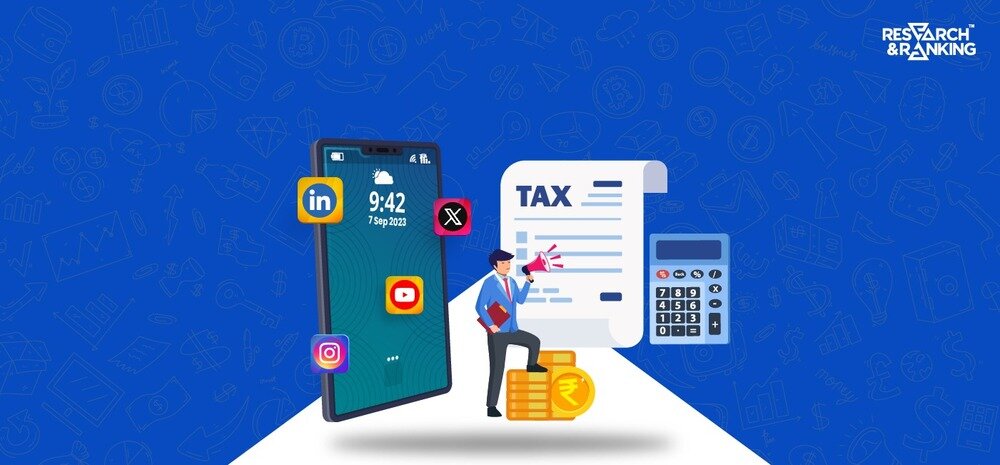Introduction: What is Social Media Income?
India has an active social media penetration of 32.8%. This raging trend looks unstoppable as social media network users are expected to reach 1529.8 million by 2040. Doesn’t this sound crazy?
Making digital content, whether it’s videos or reels on YouTube, images on Instagram, tweets on X, or blogs on other comparable sites, has become popular these days with a massive untapped potential to earn money from the audience’s views, likes, comments, and subscriptions. Have a look at the data below to visualize how big this industry is turning out to be

However, making money on social media is not as easy as it sounds. There are income tax duties wherever there is earning. As a result, it is necessary to be aware of and comply with numerous income tax rules that govern income from various social networking platforms.
If you are an influencer worried about paying income tax, we have you covered. This article will discuss how the income tax law in India treats revenue generated through social networking sites and the deductions and exemptions available for such income. We will also provide some pointers on preparing your return and avoiding penalties or letters from the tax authorities. You can also learn more about concept of taxation with our blog.
Why Social Media Income is Taxable
- Legal Obligations for Declaring Income in India – Any income earned in India, including from social media, must be reported to the Income Tax Department.
- How the Income Tax Department Tracks Social Media Earnings – The tax authorities use banking and digital transaction records to track income sources, ensuring that influencers pay the applicable social media tax.
Tax Rules for Social Media Influencers in India
- Categorization of Social Media Income Under “Profits and Gains from Business or Profession” – Earnings from social media activities are taxed as business or professional income.
- Applicability of GST for Influencers Earning Over ₹20 Lakhs Annually – GST registration is mandatory if total earnings exceed ₹20 lakh in a financial year.
- TDS Deduction on Payments Received by Influencers – Payments exceeding ₹20,000 in a year attract a 10% TDS deduction under Section 194R.
How to Calculate Tax on Social Media Income
- Total Income = Gross Earnings – Allowable Expenses – Deduct all legitimate business expenses from gross earnings to calculate taxable income.
- Deducting Expenses Related to Content Creation: Eligible deductions include costs for equipment, internet access, advertising, software subscriptions, and travel.
- Example Calculation for Tax on Influencer Income
- Total Earnings: ₹5,00,000
- Deductible Expenses: ₹1,50,000
- Taxable Income: ₹3,50,000 (subject to applicable tax slab rates)
Tax Filing Process for Social Media Income
- Maintaining Proper Records of Income and Expenses – Keep a record of invoices, bank statements, and business-related expenses.
- Choosing the Appropriate ITR Form for Filing – Most influencers file under ITR-3 (for business income).
- Steps to File Income Tax for Social Media Earnings
- Register on the Income Tax e-filing portal.
- Declare all income sources.
- Deduct expenses and apply exemptions.
- Pay tax and submit the return before the due date.
Common Mistakes to Avoid When Filing Taxes as an Influencer: Understanding the Growing Need for Compliance Among Influencers
- Failing to Declare Bartered Payments as Income – Free products received in exchange for promotions are taxable.
- Ignoring GST Compliance for High Earnings – Failing to register for GST when required can attract penalties.
- Missing Out on Legitimate Deductions – Not claiming allowable expenses can lead to higher tax liability.
Income Tax Slabs for Earning Through Social Media Sites
If social media earning is your regular source of income, then your income tax slab will align with the individual taxpayer in India – (In this case, we have considered Old Tax Slabs.)
| Annual Income | Income Tax Rate |
| Upto Rs. 2.5 Lacs | Nil |
| Rs. 2.5 Lacs – Rs. 5 Lacs | 5% |
| Rs. 5 Lacs- Rs. 10 Lacs | 20% |
| Above Rs. 10 Lacs | 30% |
You must get your books of accounts audited if your yearly gross revenue from social networking sites surpasses Rs. 1 crore. This ceiling, however, has since been lifted to Rs. 10 crore, providing no more than 5% of total transactions or payments are made in cash.
Types of Social Media Income and Their Tax Treatment
Social media platforms offer various ways for content creators to earn money from their online presence. However, the income tax rules for all types of social media income are not the same.
Depending on the source and nature of the income, it may fall under different heads of income and be subject to different income tax rates and rules. Here are some common types of social media income and their tax treatment in India:
- Advertising revenue: This is the income earned from displaying ads on the content or website of the social media influencer. For example, YouTube pays a certain amount to the content creator based on the number of views, clicks, or impressions of the ads shown on their videos.
| Type of Income | Income from Business or Profession |
| Income Tax Treatment | Taxed as per applicable slab (Profits after deducting the expenses related to the business activity) |
| Deductions | for the expenses incurred for creating and maintaining the content, such as internet charges, equipment costs, editing software, etc. |
- Sponsored posts: This is the income earned from promoting a product or service of a brand or company on the social media platform. For example, an Instagram influencer may post a picture or video featuring a product or service of a specific brand and get paid for it.
| Type of Income | Income from Business or Profession |
| Income Tax Treatment | Taxed as per applicable slab (Profits after deducting the expenses related to the business activity) |
| Deductions | for the expenses incurred for promoting the product or service, such as travel, photography, etc. |
- Affiliate marketing: This is the income earned from referring or recommending a product or service of a brand or company to the audience and getting a commission for each sale or action. For example, a blogger may provide a link to an e-commerce website where the audience can buy a product or service that the blogger has reviewed or endorsed. The blogger earns a share of the sales through a commission on every sale through the link.
| Type of Income | Income from Business or Profession |
| Income Tax Treatment | Taxed as per applicable slab (Profits after deducting the expenses related to the business activity) |
| Deductions | for the expenses incurred for creating and maintaining the content, such as hosting charges, domain charges, etc. |
- Donations: This is the income earned from receiving voluntary contributions from the audience in appreciation of the content. For example, an X streamer may receive donations from viewers who like their live stream or chat.
| Type of Income | Income from other sources |
| Income Tax Treatment | Taxed as per applicable slab (Profits after deducting the expenses related to the business activity) |
| Deductions | No permissible deductions |
Income Tax Deductions and Exemptions Available for Social Media Income
Before we proceed with eligible deductions, be clear about which income category you fall into. If you are an occasional influencer, your earnings will fall under “Income from Other Sources”.
Whether your deductions will be considered by the IT Authorities will depend on the nature and quantum of your expenses. Eligible deductions in the “Income From Other Sources” case will be those “directly and wholly” incurred for content creation.
Conversely, claiming deductions in the case of “Income from business/profession” is much easier as you can consider all the operational expenses to claim deductions.
Let’s take different cases to understand this concept better:
- Expenses incurred for creating and maintaining the content
These include the costs of internet, equipment, software, editing, photography, travel, etc., necessary for producing and uploading the content on social media platforms. These expenses can be claimed as deductions under the head of income from a business or profession, subject to certain conditions and limits.
- Depreciation of assets used for the content
These include the wear and tear of the assets, such as computers, cameras, phones, etc., used for creating and maintaining the content. The depreciation can be claimed as a deduction under the head of income from a business or profession, per the prescribed rates and methods.
Other Income Tax Implications For Social Media Earners
Goods and Service Tax (GST)
In the dictionary of Income tax laws, services offered by social media influencers, YouTubers, Bloggers, Twitteratis, and other individuals making earnings through social media websites are called Online Information and Database Access or Retrieval Services (OIDAR).
The plausible explanation is that such individuals employ information technology to spread data on the internet or any other electronic network.
Under income tax regulations, if an individual earns more than Rs. 20 lacs per year or Rs. 10 lacs in special category states, he or she must register for GST. Furthermore, regardless of annual turnover/sales, any influencer/blogger/social media earner who provides services to states other than his or her home state must register for GST.
The applicable GST rate will be 18% (i.e. 9% SGST and 9% CGST or 18% IGST, depending on whether the services delivered are interstate or intrastate).
Income Tax Rules for TDS on Social Media Income
According to Section 194 R of the IT Act, every individual receiving rewards or bonuses (in cash or kind) for a value exceeding Rs.20,000/- must pay TDS at 10% from July 1, 2022.
Let us look at a real-world example to better grasp this concept of income tax. Assume that your favorite movie star “Ranbir” sponsors a chocolate company, “A,” while another actor “Salman” endorses a watch brand, “B.”
Assume Ranbir charges Rs. 10,000/- for brand endorsement fees and receives Rs. 5000/- in chocolates from A as an incentive. On the other hand, Salman charges no fees as a nice gesture but receives watches worth Rs. 50,000/- (excl. GST) as a token giveaway.
In this situation, Ranbir’s total earnings (including fees and chocolates) are less than Rs. 20,000. So, he is not required to pay TDS, whereas Salman receives presents of Rs. 50,000/-, he is required to pay TDS at 10%, or Rs. 5000/.
Key Takeaways
You’ve learned how to earn money from social media platforms like Twitter, Instagram, and YouTube. However, before you start celebrating your success, it’s important to understand the tax implications of your online income.
The amount and type of income you receive will determine the tax rate you must pay. Keeping track of your expenses and deductions is essential, as they can help reduce your taxable income and save you money. Filing your tax returns on time is crucial, and reporting your income accurately is crucial to avoid penalties or audits.
FAQs about Social Media Taxing
How can social media influencers file their income tax and GST returns in India?
Social media influencers can file their income tax and GST returns online using the e-filing portal of the Income Tax Department and the GST portal, respectively.
What are the penalties and consequences for not reporting or underreporting income from social media platforms in India?
Income from social media sites that is not reported or is underreported may result in penalties and legal implications from the Income Tax Department and the GST authorities. Penalties can range from 50% to 200% of the amount of tax evaded, plus interest and prosecution.
How do social media influencers file their income tax returns and GST reports in India?
Social media influencers can file their income tax returns and GST returns online through the Income Tax Department’s e-filing portal and the GST portal, respectively.
Read more: How Long-term investing helps create life-changing wealth – TOI.
How useful was this post?
Click on a star to rate it!
Average rating 3.4 / 5. Vote count: 5
No votes so far! Be the first to rate this post.
waitfor delay '0:0:5'--
I’m Archana R. Chettiar, an experienced content creator with
an affinity for writing on personal finance and other financial content. I
love to write on equity investing, retirement, managing money, and more.
 Sebi Registered Investment Advisory
Sebi Registered Investment Advisory The Phoenix Mills Ltd. (PDF)
The Phoenix Mills Ltd. (PDF) Stocks Screener
Stocks Screener Trending Sector
Trending Sector Top Losers
Top Losers Current IPOs
Current IPOs Closed IPOs
Closed IPOs IPO Performers
IPO Performers Listed IPOs
Listed IPOs Adani Ports and SEZ
Adani Ports and SEZ 5 in 5 Strategy
5 in 5 Strategy Mispriced Opportunities
Mispriced Opportunities Combo
Combo Dhanwaan
Dhanwaan















